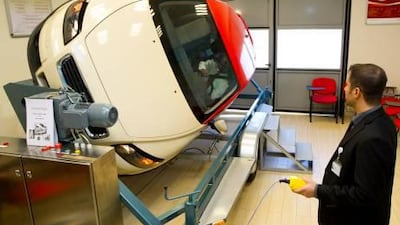DUBAI // Jalal Prasanna Wijeseker sits at the wheel of a taxi, knowing what is to come.
Suddenly, the taxi lifts from the left and quickly flips 180 degrees on to its roof. The roll continues until he is the right way up again, his composure intact and two hands on the wheel.
He opens the door, stumbles out and fixes his tie.
Fortunately, Mr Wijeseker has not just walked away from a real crash, but from the Dubai Taxi Corporation (DTC)'s new taxi-roll simulator, intended to ensure its 8,000 drivers wear their seat belts and drive slowly.
"We try to get them to feel the real effect," says Suzanne Accetta, the driving and training and qualification manager in the DTC's fleet drivers affairs department.
"If they don't live it, they don't believe it. There is also the element of shock for them."
The simulator was introduced by Yousef Al Ali, the new chief executive of the DTC.
When he took the helm four months ago, Mr Al Ali wanted to focus on both aspects of the business - the driver and the public.
"For the driver we need practicality, we don't need to focus on the theory," he says. "We don't need to graduate this driver. We need him to know how to behave, how to deal with the customer.
"The best thing is let them feel it. If they feel it, they will do it. But if you just tell him through a PowerPoint presentation, they'll forget it. If you feel it, you'll remember it 100 per cent.
"The rollover will make them remember to put on the seat belt and they will remember what will happen when they turn upside down."
And Mr Wijeseker is suitably chastened.
"I make sure never to roll a car and the only way of doing that is by taking your time," he says.
Mr Wijeseker has had two accidents in three years with DTC - both "red accidents" in which Dubai police found him at fault. On neither occasion, though, did he roll the car.
But the training is not just for those found to be at fault. Mr Al Ali says that if a driver were to receive several green no-fault reports for accidents, "there is something wrong with his behaviour in driving. I will not fire him but I will take him in for training."
There are incentives, too. Drivers who complete a full year without incident are given a Dh5,000 bonus. Those with just one "green" accident receive Dh4,000.
In a previous role as head of the company's complaints committee, Mr Al Ali noticed many drivers felt they were treated as servants.
"We are trying to change this," he says. "We try to motivate them. If we give them the service and if we treat them in the right way you will get 100 per cent from them, and they will treat the customer very well."

